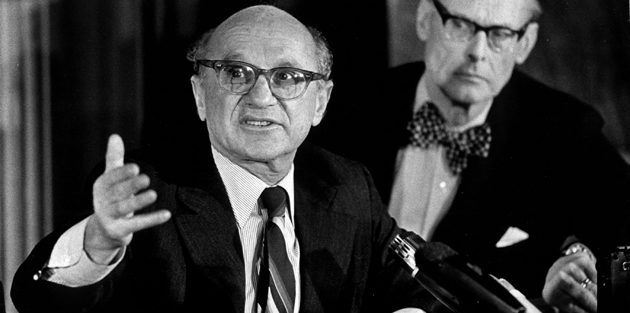Profits Are the Only Business of Business by D.W. MACKENZIE
Forty-three years ago today Milton Friedman published his article “The Social Responsibility of Business Is to Increase its Profits.” It is to Friedman’s credit that most of this short article rings as true today as it did on September 13, 1970. It is at the same time disappointing that this piece remains timely precisely because too few Americans have understood and accepted Friedman’s arguments against corporate executives promoting social welfare over private profit.
How do the specifics of Friedman’s article look today? Does an executive who spends profits to promote “social ends,” to fund education, or to “fix the environment” impose what amounts to a tax? Yes, Friedman is correct.
Is the imposition of such a de-facto tax undemocratic? Perhaps it is. Friedman admits that the shareholders could fire a CEO for imposing a de-facto “social responsibility tax”- so the shareholders can vote against their CEO. Legally, the CEO is an agent of the stockholder, their employee. However, proposals to spend part of corporate profits on socially responsible ends aim at overriding the interests of shareholders; it undermines the democratic element of corporations.
Do arguments for redirecting corporate policies toward social responsibility erode personal liberty, aim at conformity, and promote socialism and collectivism? Yes. Stockholders invest in a corporation for profit, for personal gain. If the CEO starts aiming at social ends at the expense of private shareholder interests, then the corporations is effectively being run as if it were owned by society. This is, in effect, socialism. As Friedman put it, the social justice doctrine “would extend the scope of the political mechanism to every human activity.” The idea of aiming at social responsibility actually means directing corporate funds toward one person’s particular opinion about the interests of “society.” Social welfare and social justice are, at very best, vague concepts. As Ludwig von Mises put it in his 1949 treatise, “under socialism one will dominates.”
Friedman also claims that taxation by the state is the legitimate mechanism for collecting funds to promote socially responsible ends. We have constitutional, legislative, and judicial mechanisms to collect and spend legal tax dollars. Is this claim true? Are legal tax mechanisms better at promoting social responsibility than the illicit use of corporate funds for these purposes? Friedman notes, quite correctly, that people who push for socially responsible corporate policies are those who have failed to convince their fellow citizens to support their personal version of social responsibility. Having failed in an attempt to use the political mechanism, they resort to trying to politicize the market mechanism. Friedman is right, but this brings us back to my assessment of Friedman’s article: Friedman has himself failed to convince his fellow citizens that his view of profit is correct.
I agree that democracy can only work if public discourse works. The best ideas will rise to the top of an open and free debate among rational, reasonable people. I agree that people who press for corporate social responsibility are usually collectivists who press for conformity and disdain opposite points of view. However, the fact that political debate involves a high degree of intransigence and emotion means that the democratic process does not function very well.
Consequently, I must disagree with Friedman’s assertion that the public sector can work effectively to promote social responsibility. The fact that so many people continue to press for social responsibility and economic justice against Friedman’s advice shows that his support of government taxation for social responsibility is unfounded. Friedman is correct in noting that the great merit of private enterprise is that it makes people responsible for all their actions, either selfish or unselfish. However, lack of personal responsibility in the public sector does not promote responsibility in thinking about how to best use tax dollars in a socially responsible manner.
The main elements of Friedman’s article are correct. The sum of these elements is highly questionable when it comes to his confidence in political mechanisms. Profits are the only business of business. Social responsibility should be the business of government, but it is time to recognize that the modern tax and regulatory state has failed in this endeavor.

ABOUT D.W. MACKENZIE
D. W. MacKenzie is an assistant professor of economics at Carroll College in Helena, Montana.


